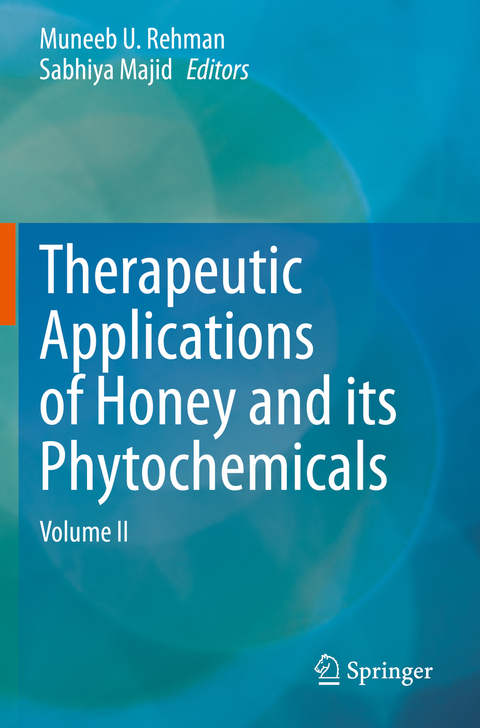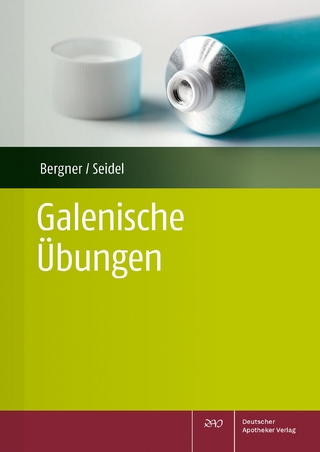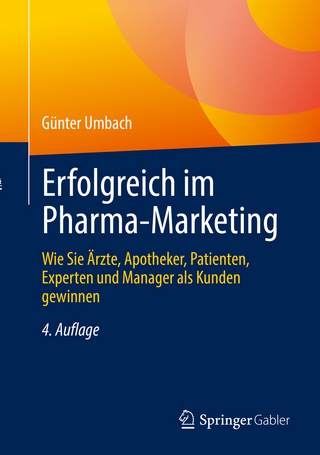
Therapeutic Applications of Honey and its Phytochemicals
Springer Verlag, Singapore
978-981-15-7307-1 (ISBN)
This book provides evidence-based information on the pharmaceutical potential of honey along with its therapeutic applications and precise mechanisms of action. It discusses in detail the phytochemistry and pharmacological properties of honey, highlighting the economic and culturally significant medicinal uses of honey and comprehensively reviewing the scientific research on the traditional uses, chemical composition, scientific validation, and general pharmacognostical characteristics. Given its scope, it is a valuable tool for researchers and scientists interested in drug discovery and the chemistry and pharmacology of honey.
Muneeb U. Rehman is a faculty member at College of Pharmacy, King Saud University, Riyadh, Saudi Arabia. He holds a doctorate in Toxicology (specialization in cancer biology and natural product research) from Jamia Hamdard, New Delhi, India Dr. Rehman has more than 10 years of research and teaching experience in the field of toxicology, biochemistry, cancer biology, natural product research and pharmacogenomics. He is the recipient of several national and international fellowships and awards. He has published 90 research papers in peer-reviewed, international journals, and 25 book chapters. Dr. Rehman is an on the editorial boards and is a reviewer of several high-impact, international scientific journals. He is also a life member of various international societies and organizations. Currently, Dr. Rehman is engaged in studying the molecular mechanisms of cancer prevention by natural products and the role of pharmacogenomics and toxicogenomics in evaluating the effectiveness and safety of drugs. Sabhiya Majid is a Professor and Chairperson of the Department of Biochemistry, Govt. Medical College (GMC-Srinagar), J&K, India. She is also the Nodal Officer of the Multi-disciplinary Research Unit (ICMR-MRU) funded by Indian Council of Medical Research. Prof. Majid has received numerous grants from various Government of India funding agencies, and has implemented various research projects and infrastructure development schemes, including FIST–DSTGOI (Department of Science & Technology, Fund for Improvement of Science &Technology Infrastructure, Govt. of India. She is a member of several scientific associations and Boards of Undergraduate, Postgraduate and Research Studies. Prof. Majid has 25 years of experience in teaching, research and supervision of diagnostic laboratories at the Govt. Medical College Srinagar, including teaching MBBS, BDS, nursing and medical laboratory technology students. Her current research focuses on identifying non-invasive markers for cancer diagnosis.
Chapter 1. Molecular Mechanistic Approach of Important Anti-leukemic Compounds Present in Honey.- Chapter 2. Possible Therapeutic Potential of Flavonoids and Phenolic Acids from Honey in Age Related Neurodegerative Diseases via Targeting NAD+ Degradation.- Chapter 3. Neuroprotective Effects of Honey: A Mechanistic View.- Chapter 4. Molecular Mechanisms of Phytochemicals from Honey in Prevention and Treatment of Cancer.- Chapter 5. An Assay on Mechanisms of the Anti-Fibrotic Effects of Honey.- Chapter 6. A Mechanistic Perspective on Chemopreventive and Therapeutic Potential of Phytochemicals in Honey.- Chapter 7. Phyto-Chemicals from Honey as MAP-Kinase Inhibitors: Current Therapeutic Standing and Future prospects.- Chapter 8. Clinico-Pharmacological Perspective of Honey and Propolis.- Chapter 9. Scope of Honey in Diabetes and Metabolic Disorders.- Chapter 10. Honey and it Molecular Pharmacology: An Essay.- Chapter 11. Therapeutic and Prophylactic Effects of Honey on Dermatitis and Related Disorders.- Chapter 12. Honey Intake and Risk of CVDs: A Mechanistic Disclosure.- Chapter 13. Role of Phytochemicals from Honey in Prevention and Treatment of Arthritis and Related Disorders.- Chapter 14. Honey in Anticancer Drug Toxicity.- Chapter 15. A Crosstalk Between Anti-inflammatory and Wound Healing Properties of Honey.- Chapter 16. Phytochemicals from Honey: Novel weapon for the prevention and treatment of cancers.- Chapter 17. Beneficial Effects of Honey Flavonoids in Non-alcoholic Fatty Liver Disease: An update.- Chapter 18. Honey Products and Their Potential in Wound Healing.- Chapter 19. Chrysin, an Important Active Ingredient of Honey: Beneficial Pharmacological Activities, and Molecular Mechanism of Action.- Chapter 20. Honey and its Potential Anti-breast Cancer Properties: Mechanistic Insights.
| Erscheinungsdatum | 29.12.2021 |
|---|---|
| Zusatzinfo | 67 Illustrations, color; 25 Illustrations, black and white; XIII, 451 p. 92 illus., 67 illus. in color. |
| Verlagsort | Singapore |
| Sprache | englisch |
| Maße | 155 x 235 mm |
| Themenwelt | Medizin / Pharmazie ► Pflege |
| Medizin / Pharmazie ► Pharmazie ► PTA / PKA | |
| Naturwissenschaften ► Biologie ► Biochemie | |
| Naturwissenschaften ► Chemie ► Organische Chemie | |
| Naturwissenschaften ► Chemie ► Technische Chemie | |
| Technik | |
| Schlagworte | Anti-cancer • Antioxidants • honey • Human health • pharmacology • Phyto-chemicals |
| ISBN-10 | 981-15-7307-7 / 9811573077 |
| ISBN-13 | 978-981-15-7307-1 / 9789811573071 |
| Zustand | Neuware |
| Informationen gemäß Produktsicherheitsverordnung (GPSR) | |
| Haben Sie eine Frage zum Produkt? |
aus dem Bereich


